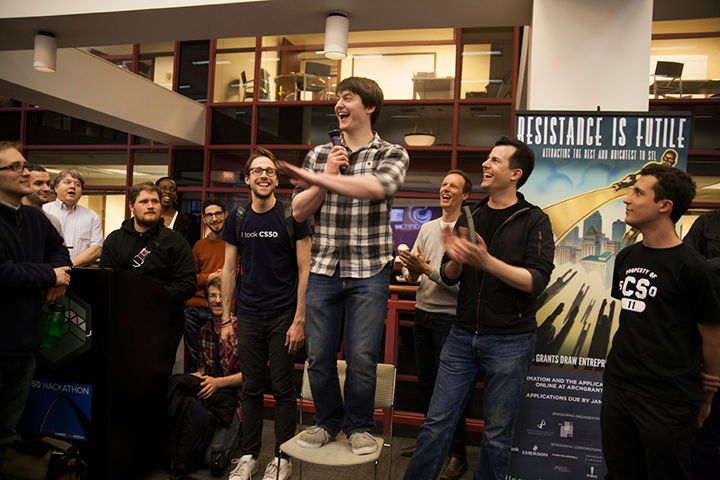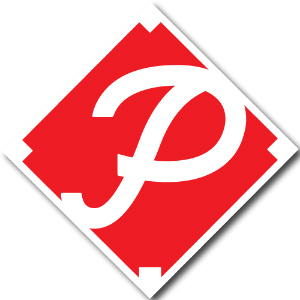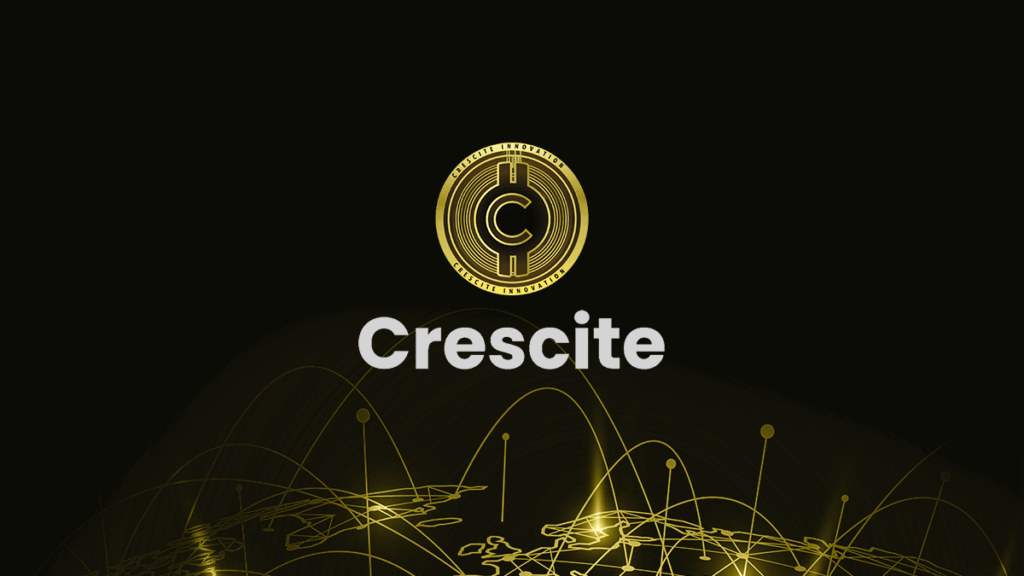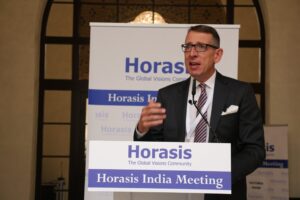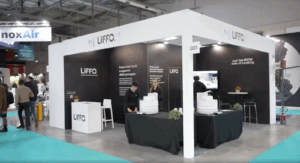 This weekend almost 300 aspiring coders ascended on T-Rex, excited to meet their online Harvard professor, David Malan, and his team in person. Many participants of St. Louis’ first ever cs50 hackathon heard about cs50, the free edX course, through LaunchCode. LaunchCode is a local effort to pair aspiring coders with companies for paid apprenticeships. By getting students together, they offer much-needed support to get through the difficult material. The excitement was palpable as cs50 students stood shoulder-to-shoulder, laptops in tow. The event included table tops filled with candy, Pi Pizza, Kaldi’s coffee and a photo booth, complete with props and muppets designed specifically after members of the cs50 team. Brendan Lind, a co-founder of LaunchCode, is quick to point out that passing statistics through edX are stark. Approximately one percent of people who register for cs50 pass it. But after approximately 1,000 people showed up for the first LaunchCode information session, about half registered for the class. Of that, Lind estimates 200 students are actively engaged. With the average student currently on the 5th or 6th problem set (there are eight total plus a final project), LaunchCode is poised to blast through the completion rate. Malan Offers To Bring Team To St. Louis Malan and his team had heard of LaunchCode and their use of cs50. When Malan heard Jim McKelvey, a co-founder of LaunchCode and the digital payment system Square, was meeting with EdX, he reached out for a meeting to ask how he could improve cs50. McKelvey and other LaunchCode members didn’t have specific suggestions, so Malan offered to visit St. Louis with the team. This idea evolved into a livestreamed hackathon for LaunchCode participants. Within hours of hearing about the event, Monsanto agreed to cover all costs. Because cs50 relies heavily on video, most students already knew the names and faces of Malan’s Teaching Fellows. Several cs50 team members from the instructional videos introduced themselves. The crowd saved its biggest cheer for Zamyla Chan, whose video walk-throughs offer vital clues to completing the problem sets. Rob Bowden, a cs50 Teaching Fellow, is know for giving a lecture in Malan’s absence in the beginning of the course. Sam Campione, a St. Louis cs50 student, asked Bowden how the pressure felt. Bowden described his experience as nerve-wracking, but ultimately enjoyable. He explained that on the stage featured in the videos, it was impossible to see the class and engage with students as he often does when assisting small groups. Bowden also is impressed by the volume of participation in St. Louis. “Only a few thousand people complete cs50 annually in the entire world. To see 200 active students just in St. Louis is surprising.”
This weekend almost 300 aspiring coders ascended on T-Rex, excited to meet their online Harvard professor, David Malan, and his team in person. Many participants of St. Louis’ first ever cs50 hackathon heard about cs50, the free edX course, through LaunchCode. LaunchCode is a local effort to pair aspiring coders with companies for paid apprenticeships. By getting students together, they offer much-needed support to get through the difficult material. The excitement was palpable as cs50 students stood shoulder-to-shoulder, laptops in tow. The event included table tops filled with candy, Pi Pizza, Kaldi’s coffee and a photo booth, complete with props and muppets designed specifically after members of the cs50 team. Brendan Lind, a co-founder of LaunchCode, is quick to point out that passing statistics through edX are stark. Approximately one percent of people who register for cs50 pass it. But after approximately 1,000 people showed up for the first LaunchCode information session, about half registered for the class. Of that, Lind estimates 200 students are actively engaged. With the average student currently on the 5th or 6th problem set (there are eight total plus a final project), LaunchCode is poised to blast through the completion rate. Malan Offers To Bring Team To St. Louis Malan and his team had heard of LaunchCode and their use of cs50. When Malan heard Jim McKelvey, a co-founder of LaunchCode and the digital payment system Square, was meeting with EdX, he reached out for a meeting to ask how he could improve cs50. McKelvey and other LaunchCode members didn’t have specific suggestions, so Malan offered to visit St. Louis with the team. This idea evolved into a livestreamed hackathon for LaunchCode participants. Within hours of hearing about the event, Monsanto agreed to cover all costs. Because cs50 relies heavily on video, most students already knew the names and faces of Malan’s Teaching Fellows. Several cs50 team members from the instructional videos introduced themselves. The crowd saved its biggest cheer for Zamyla Chan, whose video walk-throughs offer vital clues to completing the problem sets. Rob Bowden, a cs50 Teaching Fellow, is know for giving a lecture in Malan’s absence in the beginning of the course. Sam Campione, a St. Louis cs50 student, asked Bowden how the pressure felt. Bowden described his experience as nerve-wracking, but ultimately enjoyable. He explained that on the stage featured in the videos, it was impossible to see the class and engage with students as he often does when assisting small groups. Bowden also is impressed by the volume of participation in St. Louis. “Only a few thousand people complete cs50 annually in the entire world. To see 200 active students just in St. Louis is surprising.”  Malan’s Teaching Style Attracts Students New to Programming Malan’s engaging lectures and digestible technical explanations, along with Harvard’s stature, have earned him a reputation as a leading computer science educator. Ezra Oteh, an aspiring St. Louis coder, became involved in LaunchCode after receiving an email from his sister, emphatically suggesting he become involved. He wants a job as a developer. Without LaunchCode, that would mean going back to school. He explains why he loves Malan’s lectures, “David’s style is so incredible. The way he teaches, anyone with a basic understanding of math can learn. I think anyone with a high school education could learn this from him.” Jeff Ancel, a local software developer, also believes anyone who puts their mind to it can learn to code, but people often find it too intimidating to try. He took one of Malan’s graduate courses through the Harvard extension. He thinks of programming like complicated word problems. He offers simple advice to anyone who wants to learn coding: take it one bite at a time. Malan Seeks to Make Computer Science Approachable And Exciting To All People At Harvard, 73 percent of students in cs50 have no computer science experience. Malan and his team share this statistic because they’ve learned that intimidated students often assume others have a stronger background. They hope this knowledge will make the subject more approachable and bring in a more diverse group of students. Cs50 currently has 39 percent women, which is considered very high. At Harvard, the major has 25 to 30 percent women across classes, also high. He notes that more women participate each term. Many types of diversity, such as academic interests, are increasing as well. Malan explains, “Successful coding has many levels to it. If the code works, that’s a big milestone to many students. But it can also get very poetic with as few lines, characters and symbols as possible. I also want to push back against the idea that there is one type of person or one set of interests that benefit from coding. Think about lawyers, who need to make rock solid legal contracts. Contracts, without loopholes, or without bugs if you will. People who want to be more methodical and better organize information can learn these skills through computer science.”
Malan’s Teaching Style Attracts Students New to Programming Malan’s engaging lectures and digestible technical explanations, along with Harvard’s stature, have earned him a reputation as a leading computer science educator. Ezra Oteh, an aspiring St. Louis coder, became involved in LaunchCode after receiving an email from his sister, emphatically suggesting he become involved. He wants a job as a developer. Without LaunchCode, that would mean going back to school. He explains why he loves Malan’s lectures, “David’s style is so incredible. The way he teaches, anyone with a basic understanding of math can learn. I think anyone with a high school education could learn this from him.” Jeff Ancel, a local software developer, also believes anyone who puts their mind to it can learn to code, but people often find it too intimidating to try. He took one of Malan’s graduate courses through the Harvard extension. He thinks of programming like complicated word problems. He offers simple advice to anyone who wants to learn coding: take it one bite at a time. Malan Seeks to Make Computer Science Approachable And Exciting To All People At Harvard, 73 percent of students in cs50 have no computer science experience. Malan and his team share this statistic because they’ve learned that intimidated students often assume others have a stronger background. They hope this knowledge will make the subject more approachable and bring in a more diverse group of students. Cs50 currently has 39 percent women, which is considered very high. At Harvard, the major has 25 to 30 percent women across classes, also high. He notes that more women participate each term. Many types of diversity, such as academic interests, are increasing as well. Malan explains, “Successful coding has many levels to it. If the code works, that’s a big milestone to many students. But it can also get very poetic with as few lines, characters and symbols as possible. I also want to push back against the idea that there is one type of person or one set of interests that benefit from coding. Think about lawyers, who need to make rock solid legal contracts. Contracts, without loopholes, or without bugs if you will. People who want to be more methodical and better organize information can learn these skills through computer science.”  Hackathon Elevates Challenging Experience and Builds Community For Malan, the hackathon has two main objectives: memories and engagement. “This class demands a lot of the students, and we want to create a rewarding experience. Even if it stops at the end of cs50, it will hopefully be an experience they don’t regret. And engagement is important for intrinsic motivation. It’s hard to have the discipline to watch online videos and push through the problem sets. This shows them that it’s fun and they’re not alone.” Many of the participants chose to use the hackathon to get further through cs50. Malan describes this experience as “special and heartwarming. The name Ezra comes to mind. I spoke with a young man named Ezra. For him, this class is taking him on a whole new path. To put faces to the names we only see at submissions of problem sets. It’s very heartwarming.” At previous hackathons, Malan has seen students produce exciting work. Recently, many students have been utilizing Leap Motion, a technology that enables the user to interact with the computer using hand motions. Others have created programs to work with Google Glass. Malan hopes people interested in computer science will sign up for the class. When asked if he wants to bring the hackathon to other cities, he says he doesn’t want to presume desire but invites interested people to start a conversation with him. He can be reached at [email protected]. McKelvey and Lind Want More In St. Louis To Join The Party McKelvey describes this hackathon as “part of the magic of taking this at Cambridge… You can’t deliver this through a window on a screen.” He hopes events like this will boost the pass. McKelvey has been an advocate of the digital scene in St. Louis. His take on the presence of the cs50 hackathon and the national attention on St. Louis: “It means we’ve started. But we need jobs.” He is grateful and happy to see the participation and excitement. He urges, “It’s not too late to enroll in cs50 and join LaunchCode. It’s free and it works.” Lind echoes that sentiment. “So many people get blocked at HR.” Out of 57 LaunchCode individuals placed in apprenticeships, 27 have received full-time, salaried positions with an average income of $51,500.” Lind recalls that one man had been out of work for five years. LaunchCode continues to meet every Monday and Wednesday night at the Central Library at 5:30 p.m. Lind hopes more people will become involved. Click here to learn more about LaunchCode and here to learn about cs50.
Hackathon Elevates Challenging Experience and Builds Community For Malan, the hackathon has two main objectives: memories and engagement. “This class demands a lot of the students, and we want to create a rewarding experience. Even if it stops at the end of cs50, it will hopefully be an experience they don’t regret. And engagement is important for intrinsic motivation. It’s hard to have the discipline to watch online videos and push through the problem sets. This shows them that it’s fun and they’re not alone.” Many of the participants chose to use the hackathon to get further through cs50. Malan describes this experience as “special and heartwarming. The name Ezra comes to mind. I spoke with a young man named Ezra. For him, this class is taking him on a whole new path. To put faces to the names we only see at submissions of problem sets. It’s very heartwarming.” At previous hackathons, Malan has seen students produce exciting work. Recently, many students have been utilizing Leap Motion, a technology that enables the user to interact with the computer using hand motions. Others have created programs to work with Google Glass. Malan hopes people interested in computer science will sign up for the class. When asked if he wants to bring the hackathon to other cities, he says he doesn’t want to presume desire but invites interested people to start a conversation with him. He can be reached at [email protected]. McKelvey and Lind Want More In St. Louis To Join The Party McKelvey describes this hackathon as “part of the magic of taking this at Cambridge… You can’t deliver this through a window on a screen.” He hopes events like this will boost the pass. McKelvey has been an advocate of the digital scene in St. Louis. His take on the presence of the cs50 hackathon and the national attention on St. Louis: “It means we’ve started. But we need jobs.” He is grateful and happy to see the participation and excitement. He urges, “It’s not too late to enroll in cs50 and join LaunchCode. It’s free and it works.” Lind echoes that sentiment. “So many people get blocked at HR.” Out of 57 LaunchCode individuals placed in apprenticeships, 27 have received full-time, salaried positions with an average income of $51,500.” Lind recalls that one man had been out of work for five years. LaunchCode continues to meet every Monday and Wednesday night at the Central Library at 5:30 p.m. Lind hopes more people will become involved. Click here to learn more about LaunchCode and here to learn about cs50.
Aspiring STL Programmers Give Rock Star Welcome To David Malan And His Harvard Team Of Educators
By Techli
31 marzo, 2014

